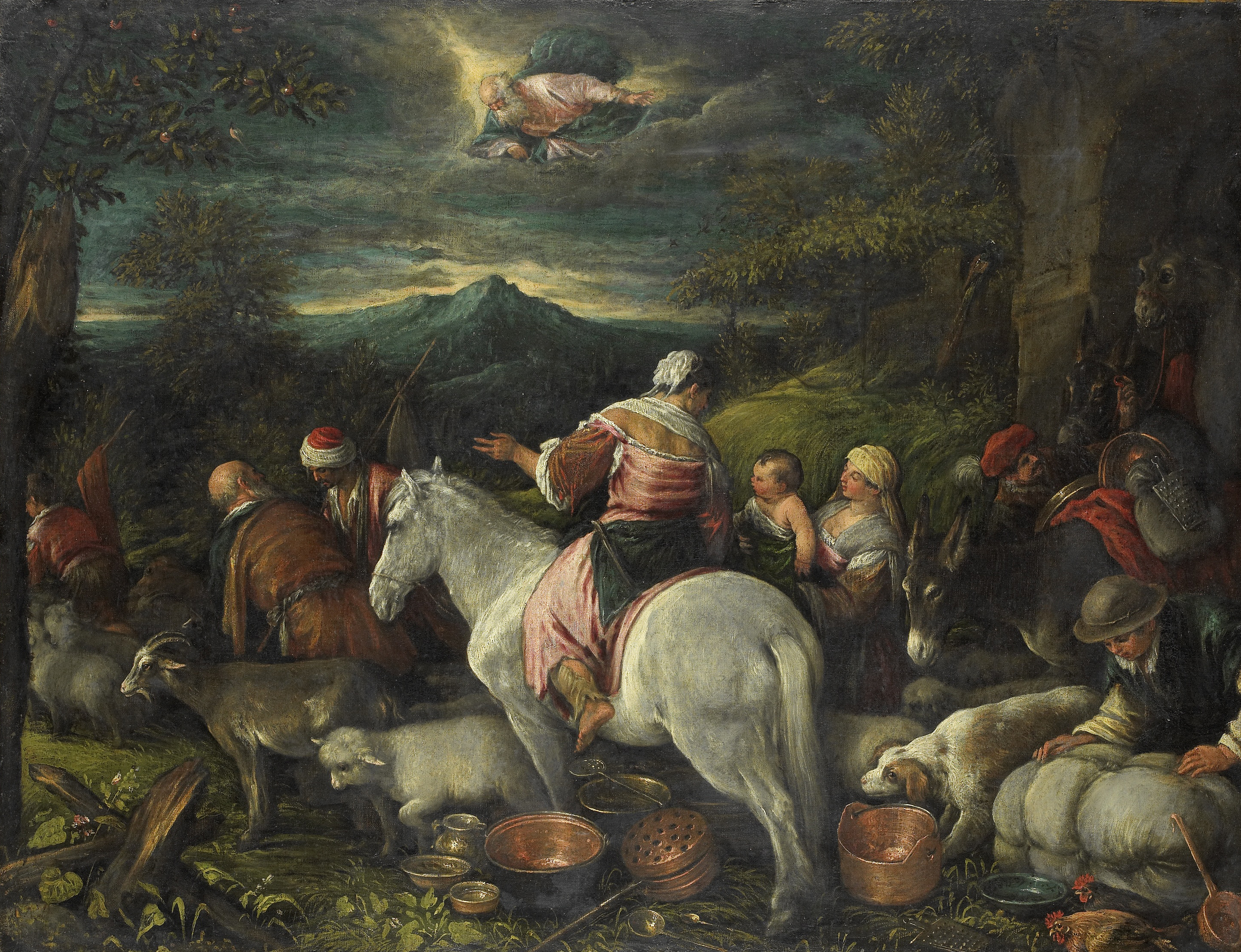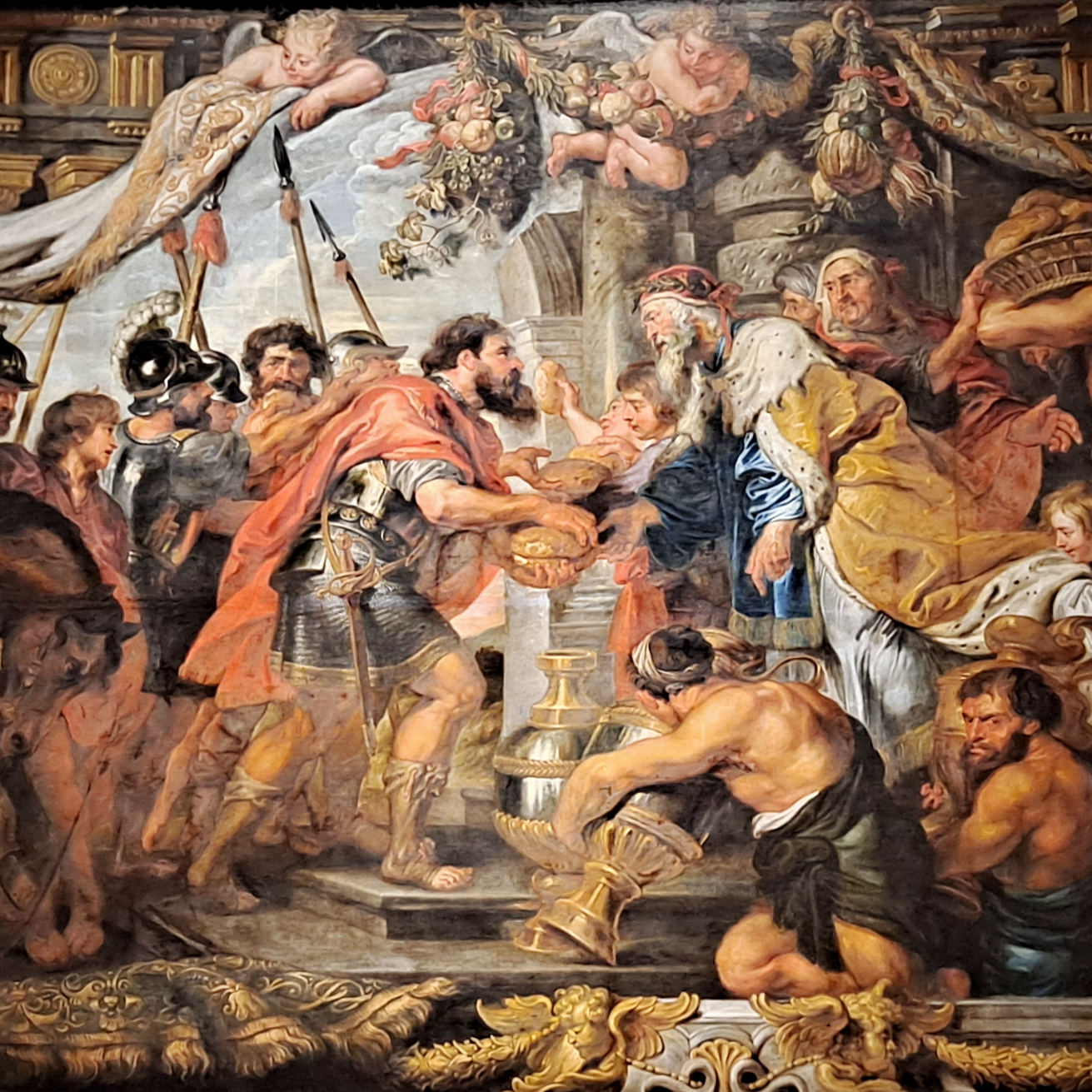The Book of Genesis establishes the foundation on which the Bible rests. It offers us insight into the nature of both God and humanity, and it begins a story of promise and hope that will culminate in the coming of Jesus. Over sixteen weeks, we’ll study the Genesis, focusing on the following:
- Session 1 - The Creation Stories (Genesis 1:1 – 2:25)
- Session 2 - Sin (Genesis 3:1 – 6:4)
- Session 3 - The Flood (Genesis 6:5 – 8:22)
- Session 4 - A New Low (Genesis 9:1 – 11:26)
- Session 5 - The Call (Genesis 11:27 – 14:24)
- Session 6 - The Covenant (Genesis 15:1 – 17:27)
- Session 7 - Abraham Wheels and Deals (Genesis 18:1 – 20:18)
- Session 8 - The Child of the Promise (Genesis 21:1 – 23:20)
- Session 9 - Isaac and Rebekah (Genesis 24:1 – 25:18)
- Session 10 - Jacob and Esau (Genesis 25:19 – 28:9)
- Session 11 - Jacob Is Jacob (Genesis 28:10 – 31:55)
- Session 12 - Jacob Meets Esau and God (Genesis 32:1 – 36:43)
- Session 13 - Joseph and His Brothers (Genesis 37:1 – 38:30)
- Session 14 - Joseph, Interpreter of Dreams (Genesis 39:1 – 41:57)
- Session 15 - Joseph and His Brothers, part 2 (Genesis 42:1 – 45:28)
- Session 16 - Israel in Egypt (Genesis 46:1 – 50:26)
During our fifth discussion, we looked at the flood from Genesis 11:27 – 14:24. The passage is below:
Now these are the descendants of Terah. Terah was the father of Abram, Nahor, and Haran; and Haran was the father of Lot. Haran died before his father Terah in the land of his birth, in Ur of the Chaldeans. Abram and Nahor took wives; the name of Abram’s wife was Sarai, and the name of Nahor’s wife was Milcah. She was the daughter of Haran the father of Milcah and Iscah. Now Sarai was barren; she had no child. Terah took his son Abram and his grandson Lot son of Haran, and his daughter-in-law Sarai, his son Abram’s wife, and they went out together from Ur of the Chaldeans to go into the land of Canaan; but when they came to Haran, they settled there. The days of Terah were two hundred five years; and Terah died in Haran.
Now the Lord said to Abram, “Go from your country and your kindred and your father’s house to the land that I will show you. I will make of you a great nation, and I will bless you, and make your name great, so that you will be a blessing. I will bless those who bless you, and the one who curses you I will curse; and in you all the families of the earth shall be blessed.”
So Abram went, as the Lord had told him; and Lot went with him. Abram was seventy-five years old when he departed from Haran. Abram took his wife Sarai and his brother’s son Lot, and all the possessions that they had gathered, and the persons whom they had acquired in Haran; and they set forth to go to the land of Canaan. When they had come to the land of Canaan,
Abram passed through the land to the place at Shechem, to the oak of Moreh. At that time the Canaanites were in the land. Then the Lord appeared to Abram, and said, “To your offspring I will give this land.” So he built there an altar to the Lord, who had appeared to him. From there he moved on to the hill country on the east of Bethel, and pitched his tent, with Bethel on the west and Ai on the east; and there he built an altar to the Lord and invoked the name of the Lord. And Abram journeyed on by stages toward the Negeb.
Now there was a famine in the land. So Abram went down to Egypt to reside there as an alien, for the famine was severe in the land. When he was about to enter Egypt, he said to his wife Sarai, “I know well that you are a woman beautiful in appearance; and when the Egyptians see you, they will say, ‘This is his wife’; then they will kill me, but they will let you live. Say you are my sister, so that it may go well with me because of you, and that my life may be spared on your account.”
When Abram entered Egypt the Egyptians saw that the woman was very beautiful. When the officials of Pharaoh saw her, they praised her to Pharaoh. And the woman was taken into Pharaoh’s house. And for her sake he dealt well with Abram; and he had sheep, oxen, male donkeys, male and female slaves, female donkeys, and camels. But the Lord afflicted Pharaoh and his house with great plagues because of Sarai, Abram’s wife. So Pharaoh called Abram, and said, “What is this you have done to me? Why did you not tell me that she was your wife? Why did you say, ‘She is my sister,’ so that I took her for my wife? Now then, here is your wife, take her, and be gone.” And Pharaoh gave his men orders concerning him; and they set him on the way, with his wife and all that he had.
So Abram went up from Egypt, he and his wife, and all that he had, and Lot with him, into the Negeb. Now Abram was very rich in livestock, in silver, and in gold. He journeyed on by stages from the Negeb as far as Bethel, to the place where his tent had been at the beginning, between Bethel and Ai, to the place where he had made an altar at the first; and there Abram called on the name of the Lord.
Now Lot, who went with Abram, also had flocks and herds and tents, so that the land could not support both of them living together; for their possessions were so great that they could not live together, and there was strife between the herders of Abram’s livestock and the herders of Lot’s livestock. At that time the Canaanites and the Perizzites lived in the land. Then Abram said to Lot, “Let there be no strife between you and me, and between your herders and my herders; for we are kindred. Is not the whole land before you? Separate yourself from me. If you take the left hand, then I will go to the right; or if you take the right hand, then I will go to the left.”
Lot looked about him, and saw that the plain of the Jordan was well watered everywhere like the garden of the Lord, like the land of Egypt, in the direction of Zoar; this was before the Lord had destroyed Sodom and Gomorrah. So Lot chose for himself all the plain of the Jordan, and Lot journeyed eastward; thus they separated from each other. Abram settled in the land of Canaan, while Lot settled among the cities of the Plain and moved his tent as far as Sodom. Now the people of Sodom were wicked, great sinners against the Lord.
The Lord said to Abram, after Lot had separated from him, “Raise your eyes now, and look from the place where you are, northward and southward and eastward and westward; for all the land that you see I will give to you and to your offspring forever. I will make your offspring like the dust of the earth; so that if one can count the dust of the earth, your offspring also can be counted. Rise up, walk through the length and the breadth of the land, for I will give it to you.” So Abram moved his tent, and came and settled by the oaks of Mamre, which are at Hebron; and there he built an altar to the Lord.
In the days of King Amraphel of Shinar, King Arioch of Ellasar, King Chedorlaomer of Elam, and King Tidal of Goiim, these kings made war with King Bera of Sodom, King Birsha of Gomorrah, King Shinab of Admah, King Shemeber of Zeboiim, and the king of Bela (that is, Zoar). All these joined forces in the Valley of Siddim (that is, the Dead Sea). Twelve years they had served Chedorlaomer, but in the thirteenth year they rebelled. In the fourteenth year Chedorlaomer and the kings who were with him came and subdued the Rephaim in Ashteroth-karnaim, the Zuzim in Ham, the Emim in Shaveh-kiriathaim, and the Horites in the hill country of Seir as far as El-paran on the edge of the wilderness; then they turned back and came to En-mishpat (that is, Kadesh), and subdued all the country of the Amalekites, and also the Amorites who lived in Hazazon-tamar. Then the king of Sodom, the king of Gomorrah, the king of Admah, the king of Zeboiim, and the king of Bela (that is, Zoar) went out, and they joined battle in the Valley of Siddim with King Chedorlaomer of Elam, King Tidal of Goiim, King Amraphel of Shinar, and King Arioch of Ellasar, four kings against five. Now the Valley of Siddim was full of bitumen pits; and as the kings of Sodom and Gomorrah fled, some fell into them, and the rest fled to the hill country. So the enemy took all the goods of Sodom and Gomorrah, and all their provisions, and went their way; they also took Lot, the son of Abram’s brother, who lived in Sodom, and his goods, and departed.
Then one who had escaped came and told Abram the Hebrew, who was living by the oaks of Mamre the Amorite, brother of Eshcol and of Aner; these were allies of Abram. When Abram heard that his nephew had been taken captive, he led forth his trained men, born in his house, three hundred eighteen of them, and went in pursuit as far as Dan. He divided his forces against them by night, he and his servants, and routed them and pursued them to Hobah, north of Damascus. Then he brought back all the goods, and also brought back his nephew Lot with his goods, and the women and the people.
After his return from the defeat of Chedorlaomer and the kings who were with him, the king of Sodom went out to meet him at the Valley of Shaveh (that is, the King’s Valley). And King Melchizedek of Salem brought out bread and wine; he was priest of God Most High. He blessed him and said, “Blessed be Abram by God Most High, maker of heaven and earth; and blessed be God Most High, who has delivered your enemies into your hand!” And Abram gave him one tenth of everything.
Then the king of Sodom said to Abram, “Give me the persons, but take the goods for yourself.” But Abram said to the king of Sodom, “I have sworn to the Lord, God Most High, maker of heaven and earth, that I would not take a thread or a sandal-thong or anything that is yours, so that you might not say, ‘I have made Abram rich.’ I will take nothing but what the young men have eaten, and the share of the men who went with me—Aner, Eshcol, and Mamre. Let them take their share.”






No comments:
Post a Comment